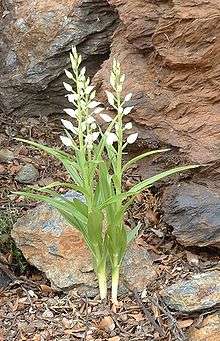Cephalanthera longifolia
| Sword-leaved Helleborine | |
|---|---|
 | |
| Sword-leaved Helleborine (Cephalanthera longifolia) | |
| Scientific classification | |
| Kingdom: | Plantae |
| (unranked): | Angiosperms |
| (unranked): | Monocots |
| Order: | Asparagales |
| Family: | Orchidaceae |
| Subfamily: | Epidendroideae |
| Tribe: | Neottieae |
| Subtribe: | Limodorinae |
| Genus: | Cephalanthera |
| Species: | C. longifolia |
| Binomial name | |
| Cephalanthera longifolia (L.) Fritsch 1888 | |
| Synonyms[1] | |
| |
Cephalanthera longifolia, known by the common names Narrow-leaved Helleborine[2] or Sword-leaved Helleborine, is an herbaceous perennial plant with rhizome belonging to the family Orchidaceae. It is native to light woodland, widespread across Europe, Asia and North Africa from Ireland and Morocco to China. This includes Iran, Russia, Kazakhstan, Turkey, Algeria, India, Pakistan, Germany, Italy, France, Spain, Portugal and many other countries.[1][3][4]
Etymology
The genus name Cephalanthera comes from the Greek κεφαλή cephalos (head) and ανθηρός antheros (anther), therefore means with round anthers. The Latin name longifolia means with long leaves .
Description
Cephalanthera longifolia reaches on average 20–60 centimetres (7.9–23.6 in) of height in typical conditions. This orchid has erect and glabrous multiple stems. The leaves are dark green, long and narrowly tapering (hence the common name of Sword-leaved Helleborine). The inflorescence is a lax, five to twenty-flowered spike with the bell-shaped flowers ascending in an oblique spiral. The flowers are white, about 1 cm (0.4 in) long, with a yellow-edged labellum and they usually open only during the warmest and brightest hours of the day. This plant can be found in bloom from April to June, depending on location and altitude. The fruit is a dry capsule and the dust-like seed is dispersed by the wind.[5]
Ecology
The flowers are pollinated by solitary bees. The flowers produce little nectar and the yellowish dust on the labellum which the insects collect is of little nutritional value. The actual pollen is contained in two pollinia which adhere to the hairs on the bee's back. The flower spikes are eaten by deer.[5]
Distribution
Cephalanthera longifolia is common in some parts of its European range, such as southern France and Spain, but endangered particularly in northern areas such as Belgium. In Britain and Ireland it is a quite uncommon and declining species, and conservation work is being carried out at a number of sites to safeguard it (see also Galley Down Wood). In 2007 it was listed as a priority species under the UK Biodiversity Action Plan. The charity Plantlife International is leading this work in the United Kingdom.
Habitat
Sword-leaved Helleborine usually grows in damp woodland places (mainly oak and beech), forest edges and rocky slopes.[5] These plants prefer calcareous soils and in well exposed places, at an altitude of 0–1,400 metres (0–4,593 ft) above sea level.
Gallery
Whole plant |
Close-up on a flower |
Flower |
Inflorescence |
Leaves |
References
- 1 2 Kew World Checklist of Selected Plant Families
- ↑ "BSBI List 2007". Botanical Society of Britain and Ireland. Archived from the original (xls) on 2015-02-25. Retrieved 2014-10-17.
- ↑ Flora of China, v 25 p 177, 头蕊兰 tou rui lan, Cephalanthera longifolia
- ↑ Altervista Flora Italiana, Cefalantera maggiore, Narrow Leaved Helleborine, Cephalanthera longifolia
- 1 2 3 "Narrow-leaved Helleborine: Cephalanthera longifolia". NatureGate. Retrieved 2013-12-30.
- Pignatti S. - Flora d'Italia (3 voll.) - Edagricole - 1982
- Tutin, T.G. et al. - Flora Europaea, second edition - 1993
- Acta Plantarum
External links
-
 Media related to Cephalanthera longifolia at Wikimedia Commons
Media related to Cephalanthera longifolia at Wikimedia Commons -
 Data related to Cephalanthera longifolia at Wikispecies
Data related to Cephalanthera longifolia at Wikispecies - Cephalanthera longifolia at the Encyclopedia of Life
- Den virtuella floran - Distribution
- Plantlife website - species listing
- Naturdata page on Cephalantera longifolia with pictures and information for this species in Portugal
- Biolib
- Cephalanthera longifolia